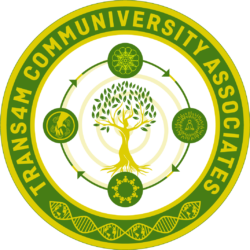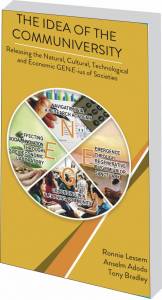What kind of knowledge do we need to survive in the present century and next? Do the current modes of knowledge creation and application address the challenges of the 21st century? How do we bridge the dichotomy between being and knowing, research and innovation, theory and practice? Perhaps for the fThe Idea of the Communiversity was born out of the communal, conscious raising and the conceptual and commercial experiences of three people: Samanyanga Ronnie Lessem, an Afro-European social philosopher, Anselm Adodo, a Nigerian-Benedictine priest, philosopher, and social scientist, and Tony Bradley, a Celtic-Christian intellectual activist. Each of them, in association with their academic and commercial organisations and societies, spread altogether over 120 years, has sought to transcend the divide between industry and academe, the spiritual and the material, community and economy, one cultural world and another. Each of them has devoted a lifetime to bridging different worlds, most especially those of community and university, albeit also aligned with spirituality and with enterprise, spread across the south and the north, the east and the west.irst time, a group of scholars—a veteran Afro-European political philosopher, a Catholic cleric, and social scientist, and an Anglican priest/political economist—have taken a step further and asked: is it possible to re-imagine and re-invent the global university system?
In The Idea of the Communiversity, they propose a new approach to the economic, social, technological, educational and moral transformation of society. This book takes an integral world’s approach to societal transformation, by pointing to ways in which we can reform our modes of knowledge creation. Through the fourfold model of community, pilgrimium, academy, and co-laboratory, Lessem, Adodo and Bradley—all intellectual and grassroots activists—have re-conceptualised a university for every people and culture, centred on the need to think local and act global. We have seen the eras of post-colonialism and decoloniality. This book ushers us into a new one—that of the Communiversity.



